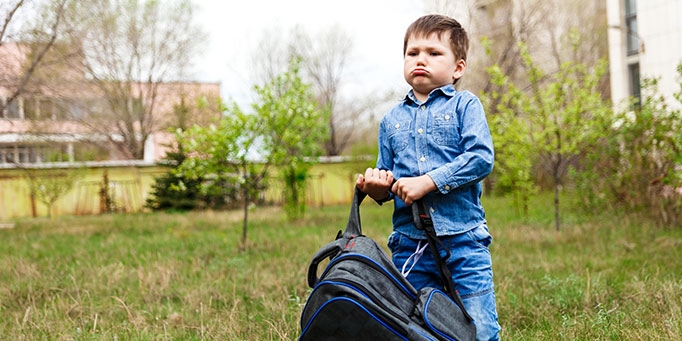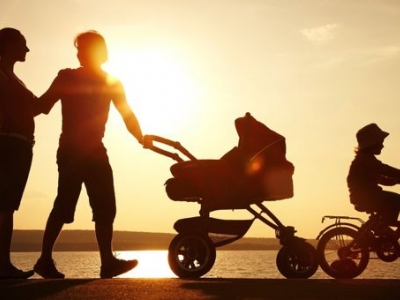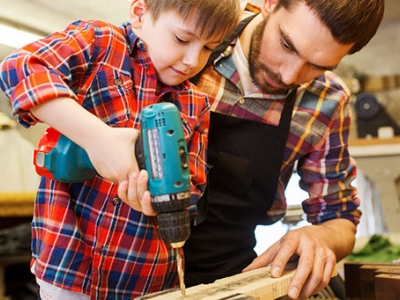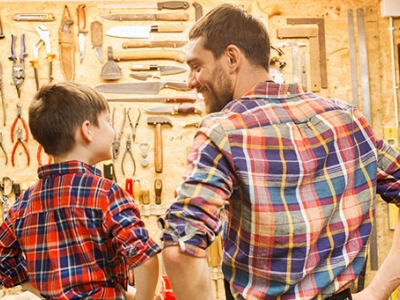
Is their backpack a burden? Parents, you need to know
Harriet Connor applies Paul’s wise words to our parenting dilemmas.
This week our third son started Kindergarten. As I lifted his stiff new backpack onto his shoulders, I asked how he felt. ‘Heavily armoured … and overloaded’, he said. Somehow he felt both protected and burdened.
When the time came for our son to leave with his teacher, he went through the gate with a wave, still bouncing despite the weight of his bag. I waved back with a brave smile, hoping and praying that he would bounce back out just as happily at the end of the day.
To carry or not to carry?
I’ve stood waving and waiting at the school gate for six years now and have witnessed many different interactions. On the first day of school, most parents offer to carry their children’s heavy load of new books and equipment—some kids accept the help but others want to carry their bag alone. After the first day, when the school bags aren’t quite so heavy, most parents leave it to their kids to carry them.
One mother I’ve seen is more of a ‘Sherpa parent’ (yes, that’s a thing!). As soon as her children walk through the gate each day, she swoops in to relieve them of their backpacks. Conveniently, she has two children—one backpack for each shoulder. On the days when a child comes out holding a musical instrument or school project, she swiftly takes that too.
It makes me wonder: should parents carry their children’s backpacks? I think the backpack is also a symbol—of all the loads that our children carry in life. As parents we face the constant dilemma: should we step in to help, or should we leave our kids to it?
- When your child forgets their lunch or library bag, should you take it in to them?
- When your younger child is getting dressed, should you do up their buttons or laces?
- When your child is putting off doing their homework, should you keep reminding them?
- When your older child is having trouble sleeping, should you stay and help them fall asleep?
- When your child is having friendship troubles, should you get involved?
- When your child is doing their chores slowly or badly, should you take over?
It depends ...
Like most parenting dilemmas, the answer is: it depends. Perhaps these wise words from the Apostle Paul might help:
Carry each other’s burdens, and in this way you will fulfil the law of Christ. If anyone thinks they are something when they are not, they deceive themselves. Each one should test their own actions. Then they can take pride in themselves alone, without comparing themselves to someone else, for each one should carry their own load. (Galatians 6: 2–5)
Paul is giving principles for Christian community in general, but his point applies to families too. Paul encourages us to ‘carry each other’s burdens’ as an expression of Christlike love, but he also says that ‘each one should carry their own load’. That is, each person has a load of responsibility that is theirs alone to bear, but there are times when that load becomes burdensome—too much for one person to carry alone.
Distinguishing between a load and a burden lies at the heart of parenting. Every one of our children is at some point on the path from helpless newborn to independent adult. It’s our job to gradually hand over responsibility as they grow, eventually making ourselves (in a practical sense) redundant.
If we carry our children’s load for them, they will not learn to carry it themselves, and will miss out on the opportunity to develop the self-confidence that comes with mastering new skills. But if we do not help our children when they truly need it, or set our expectations far beyond their capabilities, they will become discouraged.
This means that at every age, parents need to work out what is an appropriate load of responsibility for their child to carry—to know which things they should expect their child to manage without help. This will depend on the child’s age and stage of development, and on the opportunities they’ve had to practice and prepare. And of course, some situations call for flexibility, such as when a child is sick or overwhelmed.
All of this requires great wisdom, as well as:
- Education: inform yourself about the typical stages of development.
- Relationship-building: get to know your own child and their abilities.
- Intention: decide what your kids still need to learn (in partnership with your spouse).
- Training: give your kids the opportunity to learn and practice those skills.
- Self-control: don’t step in if you know your child can do it (albeit imperfectly).
- Celebration: enjoy that proud moment when they say, ‘I did it myself!’
So should you carry your children’s backpack? That depends whether it’s a load or a burden. And parents, it’s your job to know!
---
Harriet Connor is the Content Editor for Growing Faith and the author of Big Picture Parents: Ancient Wisdom for Modern Life (Wipf and Stock, 2017). She lives on the Central Coast of NSW with her husband and four sons.
For more articles from Growing Faith, subscribe to our monthly e-newsletter.
To hear about the latest books and resources from Youthworks Media, subscribe here.








